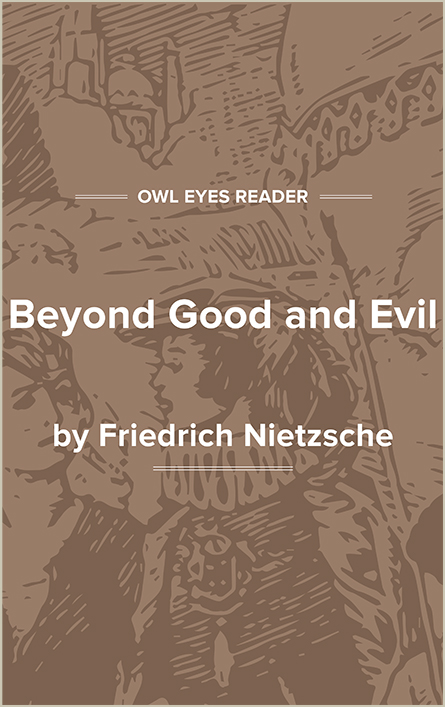Study Guide
Summary
In Also sprach Zarathustra (1883-1885; Thus Spake Zarathustra, 1896) Friedrich Nietzsche proclaims in parable and pseudo-prophetical cries the philosophy of the Superman, the being who would transcend humanity in having the will to power, going beyond conventional morality, and making one’s own law. Beyond Good and Evil carries forward, in a somewhat more temperate style, the same basic ideas, but with particular attention to values and morality. The central thesis of the book is that the proud, creative individual goes beyond good and evil in action, thought, and creation.
Ordinary people are fearful, obedient, and slavelike. The true aristocrat of the spirit, the noble, is neither slave nor citizen, but rather is a lawmaker, the one who determines by acts and decisions what is right or wrong, good or bad. The aristocrat is what the novelist Fyodor Dostoevski in Prestuplenya i nakazaniye(1866; Crime and Punishment, 1886) calls the “extraordinary” person. To sharpen his image of the noble, Nietzsche describes two primary types of morality: master-morality and slave-morality. Moral values are determined by either the rulers or the ruled. Rulers naturally regard the terms “good” and “bad” as synonymous with “noble” and “despicable.” They apply moral values to the individual, venerating the aristocrat; but those who are ruled apply moral values primarily to acts, grounding the value of an act in its utility, its service to them. For the noble, pride and strength are virtues; for the “slaves,” patience, self-sacrifice, meekness, and humility are virtues. The aristocrat scorns cowardice, self-abasement, and the telling of lies; as a member of the ruling class he or she must seek the opposite moral qualities. According to Nietzsche, The noble type of man regards himself as a determiner of values; he does not require to be approved of; he passes the judgment: “What is injurious to me is injurious in itself”; he knows that it is he himself only who confers honour on things; he is a creator of values. He honours whatever he recognizes in himself: such morality is self-glorification.
Those who are ruled, the slaves, construct a morality that will make their suffering bearable. They are pessimistic in their morality and come to regard the “good” person as the “safe” person, one who is “good-natured, easily deceived, perhaps a little stupid, un bonhomme.”
Nietzsche concludes that in slave morality “language shows a tendency to approximate the significations of the words ’good’ and ’stupid.’” Perhaps because Nietzsche regards love considered “as a passion” as of noble origin, he maintains in the chapter titled “Apophthegms and Interludes” that “What is done out of love always takes place beyond good and evil.”
A proper interpretation of Nietzsche’s work is possible only if one remembers that Nietzsche is not talking about actual political rulers and the ruled, although even in this particular case something of his general thesis applies. He is speaking instead of those who have the power and will to be a law to themselves to pass their own moral judgments according to their inclinations, and of those who do not: The former are the masters, the latter, the slaves. A revealing statement of the philosophical perspective from which this view becomes possible is the apophthegm: “There is no such thing as moral phenomena, but only a moral interpretation of phenomena.”
Nietzsche must be given credit for having anticipated to a considerable extent many of the prevailing tendencies in twentieth century philosophy. He is sophisticated about language: He understands the persuasive function of philosophy, and he is unrelenting in his naturalistic and relativistic interpretation of human values and moralities. If he errs at all in his philosophic objectivity, it is in endorsing the way of power as if, in some absolute sense, that is the way, the only right way. This flaw in Nietzsche’s...
(The entire page is 1,602 words.)
Owl Eyes subscribers get unlimited access to our expert annotations, analyses, and study guides on your favorite texts. Master the classics for less than $5/month!

